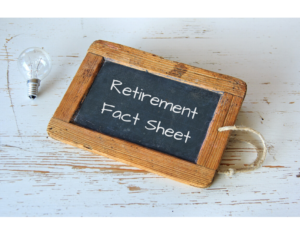A Retirement Facts Sheet
Dec 16, 2019

Does your vision of retirement align with the facts? Here are some noteworthy financial and lifestyle facts about life after 50 that might surprise you.
Up to 85% of a retiree’s Social Security income can be taxed. Some retirees are taken aback when they discover this. In addition to the Internal Revenue Service, 13 states currently levy taxes on some or all Social Security retirement benefits: Colorado, Connecticut, Kansas, Minnesota, Missouri, Montana, Nebraska, New Mexico, North Dakota, Rhode Island, Utah, Vermont, and West Virginia. (West Virginia, incidentally, is phasing out such taxation.)
Retirees get a Slightly Larger Standard Deduction on their Federal Taxes.
Actually, this is true for all taxpayers aged 65 and older, whether they are retired or not. Right now, the standard deduction for a single filer in this age bracket is $13,850, compared to $12,200 for those 64 or younger. It is scheduled to rise to $14,050 in 2020.
Retirees can still use IRAs to Save for Retirement.
There is no age limit for contributing to a Roth IRA, as long as the owner earns income. So, a retiree can keep directing money into a Roth IRA for life, provided they are not earning too much. A senior can potentially contribute to a traditional IRA until the year they turn 70½.
A Significant Percentage of Retirees are Carrying Big Debts.
Looking at data from the Federal Reserve’s triennial Surveys of Consumer Finances, the median debt of senior households (age 65+) has more than doubled since the start of the century.
The most stressful debt for seniors, according to a 2019 study from Ohio State University researchers, is credit card debt. The study calculates that each new dollar of credit card debt taken on by a senior household creates financial stress approximating an additional $14-20 of home loan debt.
Moreover, a sudden financial liability may delay retirement. Another 2019 study, co-authored by researchers from the Urban Institute and the Congressional Budget Office, looks at the potential impact of a new $10,000 debt on an individual between 55-70 years old carrying the median amount of credit card debt for their age. The researchers concluded that this jump in debt would make a baby boomer 9% more likely to put off retiring.
Fewer Seniors Live Alone than you may Think.
The Administration for Community Living (a federal agency) says around 14% of older adults (65+) live by themselves. With millennials living at home and blended and extended families becoming common, perhaps this is not so surprising. The ACL does note that nearly half of women older than age 75 are on their own.
Just 15% of Women say they have a Retirement Strategy Set Down in Writing.
This factoid comes from the 2019 Transamerica Retirement Survey`of American Workers. Another 42% say they have unwritten strategies. The remaining 43%? No strategy at all.
Few Older Americans Budget for Travel Expenses.
While retirees certainly love to travel, a Merrill Lynch study says that only about a third of people aged 50 and older earmark funds for their trips.
What Financial Facts Should you Consider as you Retire?
What monetary realities might you need to acknowledge as your retirement progresses from one phase to the next? The reality of retirement may surprise you. If you have not met with a financial advisor about your retirement savings and income needs, you may wish to do so. When it comes to retirement, the more information you have, the better.
Tags: financial advisor charlotte nc, Retirement Planning
More Insights
Few terms in personal finance are as important, or used as frequently, as “risk.” Nevertheless, few terms are as imprecisely defined. Generally, when financial advisors or the media talk about investment risk, their focus is on the historical price volatility of the asset or investment under discussion.
As Americans get their grills and beach chairs ready for the July 4th holiday, the stock market and the weather across much of the country have both been on heaters. Stocks and bonds continue to effectively navigate a complex policy landscape shaped by evolving trade dynamics, geopolitical tensions, and fiscal stimulus. The market’s resilience in … Continue reading “Market Update – America Gets Record High Stock Prices for Its Birthday”
Birthdays may seem less important as you grow older. They may not offer the impact of watershed moments such as getting a driver’s license at 16 and voting at 18. But beginning at age 50, there are several key birthdays that can affect your tax situation, health-care eligibility, and retirement benefits.
During times like these when geopolitical headlines can be unsettling for investors, we at LPL Research like to remind ourselves of one of our key investing principles. Markets have always faced challenges —ranging from geopolitical conflicts and economic downturns to natural disasters, political upheaval and health crises. These events often trigger short-term volatility and shake … Continue reading “Why Long Term Investing Beats Selling in Volatile Times”
Are you concerned about the inheritance taxes your heirs may have to pay? Then you may want to consider creating charitable lead trusts.
Services
Epic Capital provides the following comprehensive financial planning and investment management services: Learn More >


 Top of Page
Top of Page











